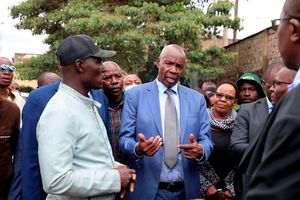There will be a smooth transition from 8-4-4 to CBC, says CS Machogu

Education Cabinet Secretary Ezekiel Machogu.
Education Cabinet Secretary Ezekiel Machogu has affirmed the government's commitment to ensuring a smooth transition from the 8-4-4 system to the Competency-Based Curriculum (CBC).
Speaking on Thursday during the release of the last KCPE exam results, Mr Machogu noted that the shift challenges that persisted until last year have been effectively ironed out through the Presidential Working Party on Education Reforms Report.
The Education CS said the ministry is preparing a Sessional Paper and drafting necessary legislation for submission to Parliament, anchoring most of the report's recommendations.
“As per plan, the first cohort of the CBC learners will transition to Grade 8 in January. All education indicators show that the cohort is undergoing quality learning and teaching. I wish to assure the country that all curriculum materials are in place to support,” said the CS.
Mr Machogu also announced the successful rollout of the New Funding Model for public universities and Technical and Vocational Education and Training (TVET) institutions.
The Variable Scholarship and Loan Funding model, recommended by the Working Party, has seen the Higher Education Loans Board release Sh5.2 billion to first-year students in public universities. Disbursement of scholarship amounts to universities and TVET institutions aims to gradually restore financial security and sustainability, enabling them to focus on their core mandates of education, training, and research.
New Funding Model
“I am happy to announce that the roll-out of the New Funding Model has been successful. Already, the Higher Education Loans Board has released the sum of Sh5.2 billion to first-year students in our various public universities. In a short while, we will be disbursing scholarship amounts to the universities as well as TVET institutions and trainees, once the necessary processing is completed,” he said.
Reflecting on Kenya's educational history since 1985, Mr Machogu highlighted a notable achievement in gender parity during the 8-4-4 period, with near-equal representation for male and female candidates from 2013 to 2022.
However, the 2023 KCPE examination witnessed a slight shift, favouring male candidates at 51.30 per cent, while female candidates accounted for 48.70 per cent. With 1,406,557 candidates sitting the examination in 28,533 centres nationwide. The CS disclosed that 205 unregistered candidates were allowed to participate, comprising 125 males and 80 females.
“Since 1985, a total of 26,067,181 candidates have been examined during the KCPE Examination. I am happy to report that the 8-4-4 period has recorded an improvement in achieving gender parity in the education sector. In 1985, the country had a low gender parity favouring males at 59.2 per cent and females at 40.8 percent,” he said.
Mr Machogu said midwives of the shift to the Competency-Based Curriculum will mainly be the products of the KCPE Examination, totalling 39 cohorts.
"As I stand before Kenyans today, let me be clear that my mission is not to sing KCPE dirges. Instead, I am here to celebrate and remind my fellow Kenyans that we are transitioning from a structure of education that has served us well for four decades to one that will serve us even better. The midwives of this new shift in the education structure to the Competency-Based Curriculum will primarily be the products of the KCPE Examination, totalling 39 cohorts,” he said.
“A candidate who sat the KCPE Examination in 1985 at the age of 14 is now aged 53. If this individual pursued a career in education, they could now be one of our most experienced teachers, likely at the level of head teacher. At our universities, such a professional would have risen to the level of a full professor,” He added





